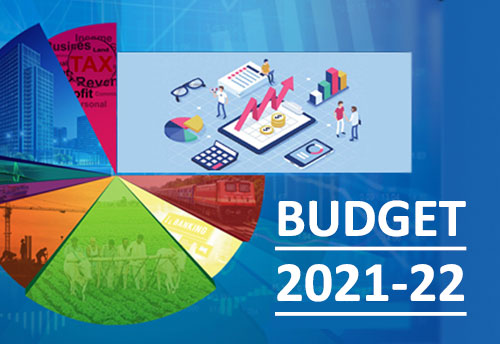BUDGET 2021: Top Five Income Tax Changes That Individual Taxpayers Should Know! What Does It Have For The Common Man?

Finance Minister Nirmala Sitharaman announced the 2021-22 Union budget on February 1. Although the focus of the budget is on healthcare, infrastructure, and other sectors, it failed to provide any special relief to the middle class in terms of income tax exemption.
Take a look at the top five changes announced by Finance Minister Nirmala Sitharaman in the 2021 budget:
1. Citizens Over 75 Years old Do Not Need to File Income Tax
The Finance Minister announced that senior citizens over the age of 75 (whose income source is only pension and interest) will be exempt from income tax returns.

If these citizens meet certain conditions, they can be exempt from filing ITR. If the interest income is earned in the same bank where the pension is deposited, the senior citizen will be exempt from filing an ITR.
2. EPF Contribution
After April 1, 2021, the interest on the employee’s share of the provident fund (PF) in excess of Rs 250,000 will be taxed at the withdrawal stage in any year.
This will result in additional tax burdens, especially for HNI (high net worth) individuals who make greater contributions, and will also discourage VPF (voluntary provident fund) contributions.
3. The Deadline for Deferred Income Tax Return will be Reduced by Three Months
Now, the last date for voluntary submission of revised income tax returns or belated returns will be after the end of the fiscal year, rather than an earlier date of March 31, 2022.
4. Extend the Tax Holiday on Affordable Housing
The Minister of Finance proposed that economically affordable housing projects can avail a tax holiday for another year before March 31, 2022.
This is to maintain the supply of affordable housing. The loan for the purchase of an affordable home can be waived by an additional Rs 150,000 in interest and is now eligible for a loan taken before March 31, 2022.
5. Higher TDS for Non-Filers of Income Tax Returns outcome of Budget 2021
The “Income Tax Act” budget 2021 Section 206AB proposed a new provision in the budget that provides for a higher rate for tax deducted from the source (TDS) for the non-filers who have not filed income taxes.
The TDS rate recommended in this section will be twice the tax rate stipulated in the relevant provisions of the Act, or twice the current tax rate, or the rate of 5%.
What does Budget 2021 have for the Common Man?
As India is emerging from the coronavirus crisis, this is the ninth budget of the Modi government including the interim one, the main goal of the Minister of Finance is to enhance spending on job creation and rural development, and generously allocate development plans and easing rules and policies to attract foreign investment.

No Tax Relief
There were immense expectations from the Budget 2021-22 which was presented by Finance Minister Nirmala Sitharaman in Parliament on Monday.
However, as the government decided to keep the income tax slabs unchanged, the salaried class and middle class did not receive any relief or exemption in income tax.
Cess On Petrol, Diesel
The Finance Minister recommends a price of 2.5 rupees per liter for petrol and 4 rupees per liter for diesel. Sitharaman announced this decision while presenting Union Budget 2021-22 in Lok Sabha.
However, since Sitharaman also proposed to reduce the basic tariffs (Basic Customs Duty) on petrol and diesel, the tax rate will not impose any additional burden on consumers as a whole.
Voluntary Scrapping Policy
On Monday, Finance Minister Sitharaman announced a voluntary vehicle scrapping policy to eliminate old and inappropriate vehicles. According to the policy, personal vehicles will undergo fitness tests in automated centers after 20 years, and commercial vehicles will be tested after 15 years.

We are separately announcing a voluntary vehicle scrapping policy to eliminate old and inappropriate vehicles. This will help encourage the use of fuel-efficient and environmentally-friendly vehicles. Thereby reducing oil import bills and vehicular pollution, Sitalaman said in Parliament while presenting the 2021-22 Union budget.
LIC IPO, Sale of Air India
Finance Minister Sitharaman announced that the center will conduct a LIC IPO in 2022 and complete the divestment of Air India in 2022.
She said: For start-ups, we allow 1% of the company to grow without being restricted by actual paid-in capital. In addition to IDBI, we plan to take-up two more banks for disinvestment. LIC’s IPO will be conducted in 2022. So far, all announced divestments, including BPCL, Air India, CONCOR, and Pawan Hans, will be completed in 2022.
Employment
The main goal of the Minister of Finance is to enhance spending on job creation and rural development, provide generous funding for development plans, and ease rules to attract foreign investment.
She announced that a new centrally sponsorship program, PM AatmaNirbhar Swasth Bharat Yojana, will be launched with an investment of approximately Rs 64,180 crore over 6 years.
This will develop the capacity of primary, secondary, and tertiary health care systems, strengthen existing national institutions and establish new institutions to adapt to the development, detection, and treatment of new illnesses and emerging diseases. This will be in addition to the national health mission.
Rs 35,000 Crore Towards Coronavirus Vaccination
Finance Minister Sitharaman provided worth 35,000 crores towards coronavirus vaccination.
I have provided Rs 35,000 crore for the coronavirus vaccine. I promise to provide more funds as needed. The health and welfare budget expenditure for 2021-22 is Rs 2.23 lakh crore, while the BE is Rs 94,452 crore and marks an increase of 137 percent, she stated while presenting the 2021-22 Budget in the Lok Sabha.
Atmanirbhar Health Yojana
Finance Minister Sitharaman also announced Aatma Nirbhar Health Yojana with an investment of 64,180 crores. Sitharaman announced while introducing Lok Sabha’s 2021-22 Union budget.
She said: The government will establish 15 health emergency centers. It will strengthen the National Center for Disease Control.
This year’s budget will focus on the seven pillars of economic recovery- Health and Wellbeing, Inclusive Development for Aspirational India, Innovation and R&D, Physical and Financial Capital and Infrastructure, Reinvigorating Human Capital, and Minimum Government Maximum Governance.




